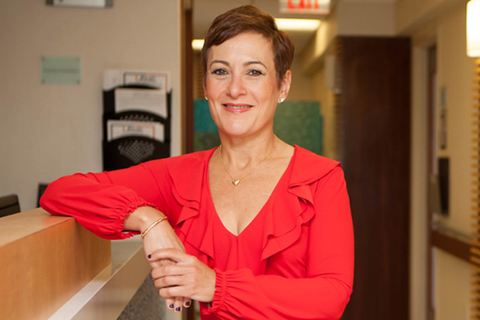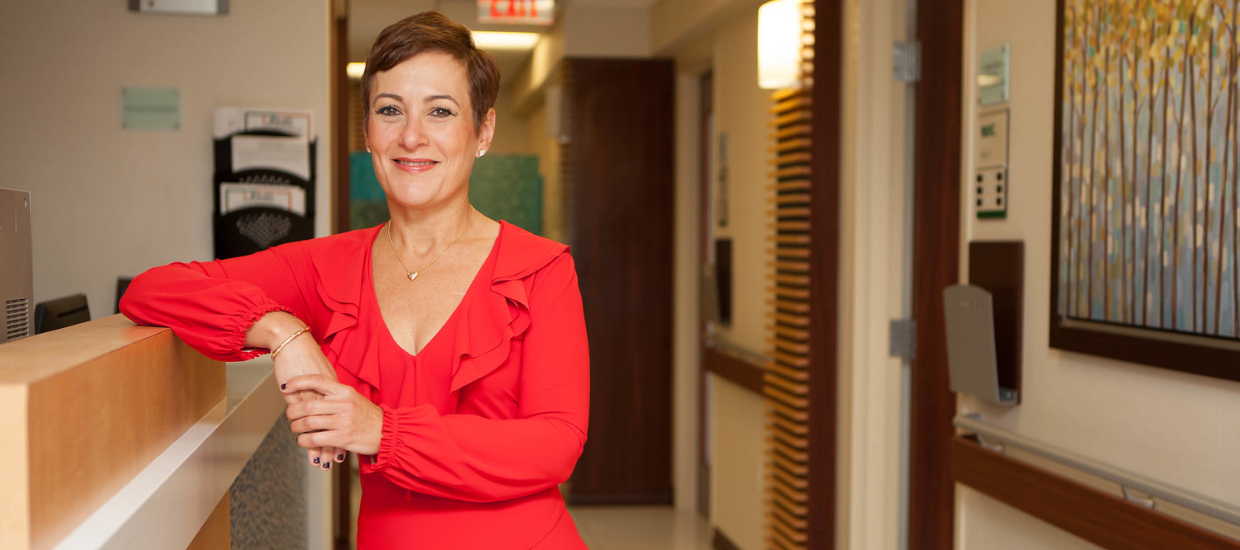Dr. Maria Abreu one of three pioneering physician-scientists awarded 2019 Sherman Prize
For her relentless work advancing novel research and treatments to understand the environmental and immunological triggers of inflammatory bowel disease, Maria Abreu, M.D.’90, director of the University of Miami Miller School of Medicine’s Crohn’s and Colitis Center, was recently recognized with one of the nation’s most prestigious honors in the field. Abreu was named as one of only three recipients of the 2019 Sherman Prize, which recognizes outstanding achievements in the fight to overcome Crohn’s disease and ulcerative colitis, also known as IBD.
The award was announced September 24 by the Bruce and Cynthia Sherman Charitable Foundation.
“Dr. Abreu is an outstanding and compassionate clinician who has championed under-represented populations in both her clinical care and research,” said Dermot P.B. McGovern, M.D., Sherman Prize Selection committee chair and the Joshua L. and Lisa Z. Greer Endowed Chair in Inflammatory Bowel Disease Genetics at Cedars-Sinai. “She has held multiple leadership positions in GI and IBD societies, relentlessly advancing the understanding of IBD while serving as an incredible role model and mentor to the next generation of IBD leaders.”
Millions of people worldwide suffer from Crohn’s disease and ulcerative colitis, which are chronic, inflammatory diseases that damage the gastrointestinal tract. While there are effective treatments, there is no cure and available medicines do not work for everyone.
The $100,000 Sherman Prize will help Abreu further her work at UM’s Crohn’s and Colitis Center, which she helped to establish in 2013. At the Center, a multidisciplinary team of IBD experts offers patients comprehensive care in one location, while also conducting laboratory research into IBD.
“In the intimacy of an exam room, it is a privilege to be allowed into a person’s life with the hope of making them better,” said Abreu, professor of medicine, microbiology and immunology, the Martin H. Kalser Chair in Gastroenterology at the University of Miami Miller School of Medicine. “Taking care of patients and finding new ways to help them has been my life’s purpose and that’s what inspires my research — the possibility of helping both my patients, as well as those that I’ll never see.”
Dr. Abreu’s research career has focused on studying how the innate immune system in the intestine deals with the presence of a high load of healthy bacteria and how that system goes awry in patients affected by IBD.
Since coming home to Miami, the Abreu lab at the Miller School has distinguished itself for focusing on the genetic and environmental factors that contribute to the development of IBD in Hispanics. This research was driven by Abreu’s observations early on that many of her Hispanic patients were the first in their family to be diagnosed with IBD. Curious about what was driving their disease, she began building the University of Miami IBD Center Clinical Phenotype Database and Tissue Repository, which now contains one of the largest number of Hispanic samples in the nation.
Abreu and her team’s rigorous collection of data enabled them to publish the first description of the phenotype — or how IBD is expressed — in Hispanic patients, as well as characterize the genetics of their disease.
She and her team went on to specifically study IBD in Miami’s Cuban immigrant population to try to understand what she saw as a rising epidemic of disease. Remarkably, they found that today’s Cuban immigrants are developing IBD much more quickly than previous generations — with IBD occurring an average of seven years after immigration, compared to an average of 30 years to disease several decades ago.
Now, Abreu is building on these insights to explore the environmental triggers that could be causing this level of disease — triggers that could be extrapolated to the wider IBD patient population.
“All of our work with Hispanic immigrants and innate immune signaling point us in the direction of diet,” said Abreu. “What happens with immigration is that diet changes abruptly, which changes the gut microbiome. There may not be enough time for the immune system to adapt, leading to an inappropriate immune response.”
Abreu is exploring potential approaches to utilize diet as a strategy to treat IBD, but she says you have to study more than just the diet itself. It’s also important to explore ways to help people follow the prescribed diet.
“It’s very hard to get people to change their diet, even when they have a disease,” she said. “I’m excited to work with my amazing team here at the University of Miami to explore different methodologies to help people commit and adhere to specific diets we’re testing for Crohn’s disease. We’re trying things that have never been done before in IBD in hopes of changing dietary behaviors.”
The other recipients of the 2019 Sherman Prize are:
- William J. Sandborn, MD, chief, Division of Gastroenterology and Director, Inflammatory Bowel Disease Center, UC San Diego Health; Professor of Medicine, UC San Diego School of Medicine, San Diego, CA; awarded a $100,000 Sherman Prize for his groundbreaking work in IBD clinical trial design that enabled a revolution in treatment that set the standard for clinical care; leading the development of innovative medicines to provide patients with much-needed options; and helping to establish holistic care models that have improved patient care and outcomes. Dr. Sandborn is a sought-after clinician who has improved the quality of life for patients who feel they have run out of options, and a mentor to colleagues and students who have gone on to run major IBD centers.
- Florian Rieder, MD, assistant professor, Department of Inflammation and Immunity; Clinical Staff, Department of Gastroenterology, Hepatology and Nutrition, Cleveland Clinic, Cleveland, OH; awarded the $25,000 Sherman Emerging Leader Prize for his key role in advancing the development of novel therapies to treat fibrostenosis, a common and potentially devastating complication of IBD. Dr. Rieder is a respected early career clinician, researcher and educator who devotes considerable energy to supporting junior talent and creating opportunities for others to make an impact for patients.
The Sherman Prize awards will be held December 12 in Orlando. To learn more about the Sherman Prize, visit www.ShermanPrize.org.





